Moonfall 4K Blu-ray Movie
HomeMoonfall 4K Blu-ray Movie 
4K Ultra HD + Blu-ray + Digital CopyLionsgate Films | 2022 | 130 min | Rated PG-13 | Apr 26, 2022
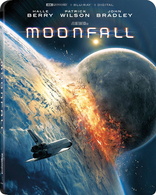
Price
List price:Amazon: $14.00 (Save 39%)
Third party: $14.00 (Save 39%)
Only 17 left in stock (more on the way).
Movie rating
5.8 | / 10 |
Blu-ray rating
| Users | 3.7 | |
| Reviewer | 3.5 | |
| Overall | 3.5 |
Overview
Moonfall 4K (2022)
When the moon is knocked off of its orbit, an unlikely team is sent to find out what happened, only to find out that the moon is not what it seems to be.
Starring: Halle Berry, Patrick Wilson, John Bradley (XXIV), Charlie Plummer, Kelly YuDirector: Roland Emmerich
| Action | Uncertain |
| Sci-Fi | Uncertain |
| Adventure | Uncertain |
| Fantasy | Uncertain |
| Thriller | Uncertain |
Specifications
Video
Video codec: HEVC / H.265
Video resolution: 4K (2160p)
Aspect ratio: 2.39:1
Original aspect ratio: 2.39:1
Audio
English: Dolby Atmos
English: Dolby TrueHD 7.1 (48kHz, 24-bit)
French: Dolby Digital 5.1
Spanish: Dolby Digital 5.1
Subtitles
English, English SDH, French, Spanish
Discs
Blu-ray Disc
Two-disc set (2 BDs)
Digital copy
4K Ultra HD
Packaging
Slipcover in original pressing
Playback
Region A (locked)
Review
Rating summary
| Movie | 3.0 | |
| Video | 5.0 | |
| Audio | 5.0 | |
| Extras | 3.0 | |
| Overall | 3.5 |
Moonfall 4K Blu-ray Movie Review
Reviewed by Jeffrey Kauffman April 19, 2022Roland Emmerich has built a career out of science fiction tinged blockbusters, though productions like The Patriot and/or Midway are notable exceptions in terms of any perceived sci-fi element, even if they like almost all Emmerich outings go for epic scale. For purposes of this review, though, it may be salient to start with Emmerich's 2009 opus, kind of hilariously called 2012, a film whose chronologically malaprop title may have subliminally recalled another science fiction film with a "yearly" title, namely 2001: A Space Odyssey. And it's actually that Stanley Kubrick masterpiece that can provide some interesting comparison points to Moonfall, though Emmerich fans may not like how their favored auteur may make out in the process. Has there ever been a more laconic film in any genre than Kubrick's massive 1968 ode to "evolution"? Just think about it for a moment: aside from some very brief expository dialogue relatively early in the film, Kubrick and screenwriter Arthur C. Clarke are almost willfully unhelpful in providing context or really even much actual information in the traditional sense, preferring instead to let the film play out in a series of sometimes baffling vignettes. What is the monolith the ancient primates "meet"? Why is it then on the Moon millennia later, or is that another one of the same general device? What does any of all of that have to do with a space mission to furthest reaches of our solar system, and what exactly is going on with Dave once he gets there? And let's not even start with the fetal "Star Child" that caps the film. Now of course there is a story to 2001: A Space Odyssey, and a rather brilliant one at that, but the film itself is an object lesson in letting an audience come to its own realizations about things, rather than having them spelled out in minute detail every step of the way.
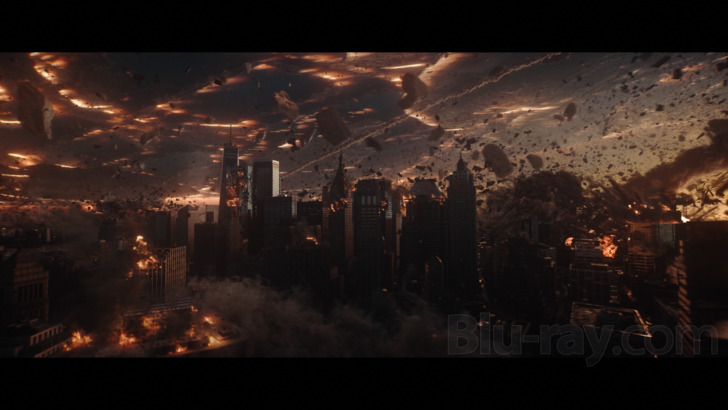
Much like 2001: A Space Odyssey, Moonfall is concerned with "evolution", at least in its broadest sense, and the moon is once again at the center of it all. However (and minor spoiler alert here, though the film's key art pretty much lets the veritable [Schrodinger's?] cat out of the bag), instead of a monolith buried deep in the moon dust, it's the moon itself that is a piece of ancient alien technology, one that may be in need of either some serious antivirus software or at least a major reboot. But before we get to that series of plot developments, and because Emmerich and his co-writing team of Harold Kloser and Spenser Cohen want to pretend that they're after some actual honest human emotion rather than simply a parade of mind blowing visual effects, there's a whole litany of personal relationships that have to be "explored".
That begins with astronauts Brian Harper (Patrick Wilson) and Jocinda Fowler (Halle Berry), who are seen in the film's opening vignette supposedly fixing a satellite in orbit above Earth in 2011, since they evidently do not know the Apocalypse is coming in a mere year, at least in the Word according to Emmerich. And actually in a way the Apocalypse does come, with a weird snakelike aggregation of black globules that attacks Brian on his spacewalk and leaves a veritable red shirt spinning off into space like, well, a certain Frank Poole in 2001: A Space Odyssey. The upshot of the situation is that Harper is disgraced when Fowler doesn't affirm his assessment that there's some kind of unknown destructive force at work in the universe, and there's a resultant whole dysfunctional family dynamic involving his ex-wife Brenda (Carolina Bartczak) and their son with the creative name Sonny (Charlie Plummer). Things aren't much happier in the Fowler camp, with her ex- husband, a general named Davidson (Eme Ikwuakor), filling up subplot material with supposed emotional underpinning. Fowler at least still has a career at NASA, on the plus side.
Meanwhile, a conspiracy theorist named K.C. Houseman (John Bradley), is absolutely convinced that the moon is both alien tech called a "megastructure" and is seriously malfunctioning, leading to orbital chaos. Suffice it to say that at least some of Houseman's theories turn out to be experientially true and in fact (is a spoiler warning necessary for a plot point so aggressively advertised by the film's glut of marketing?) actually all of his theories are eventually confirmed, though only after a seemingly endless slog through supposed history involving moon shots and ostensible discoveries made during them, as outlined by the almost inherently sinister Donald Sutherland in a glorified cameo as an ex-NASA officer.
Now all of this character information is probably relatively well and good, if awfully labored at times, but in one of the supplements on the disc frequent Emmerich cohort Harald Kloser overtly mentions that a number of his collaborations with Emmerich have started with one solitary idea and/or image, and in this case it was the concept or actual illustration of the moon crashing into the earth and what that would look like and what catastrophes it would engender that sparked the film. And, let's just face it, that is the underlying purpose of Moonfall. All of this said, it may be salient to point out how differently Emmerich and Kubrick approached what is in essence a tale of Mankind "coming of age" and finding out a bit both about its provenance and perhaps its future. Kubrick, as mentioned above, presents an ultimately understandable narrative with a minimum of expository fuss and bother.
Emmerich, on the other hand, pauses on more than one occasion for what might charitably be called Moishe the Explainer in Outer Space information dumps. One of these, offered by the Moon itself (more or less, anyway) seems to fly in the face of logic, at least logic as defined by Arthur C. Clarke in 2001: A Space Odyssey. Part of that film's subtext is that whomever was responsible for all those rectangular monoliths was smart enough to bury one on the moon, knowing that its discovery would inherently be possible only after Mankind had developed to a certain stage. In Moonfall, one has to assume a whole series of improbable events involving everything from nefarious artificial intelligence to humans "breaking into" the Moon in order for the whole "explanation" by the Moon to even begin to make sense, and it frankly may not even then.
Note: My colleague Brian Orndorf was evidently even less enthusiastic about Moonfall than I am. You can read Brian's thoughts here.
Moonfall 4K Blu-ray Movie, Video Quality 
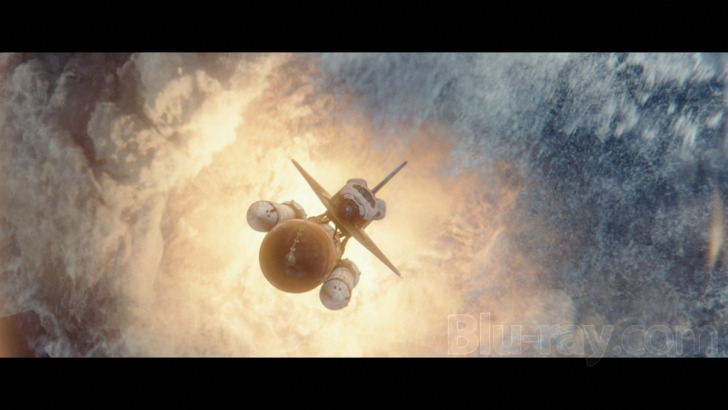
Note: Screenshots are sourced from the 1080 disc.
Moonfall is presented in 4K UHD courtesy of Lionsgate Films with a 2160p transfer in 2.39:1. Captured with Red cameras at source
resolutions up to 8K (according to the IMDb), and finished at 4K (again according to the IMDb), this is a really beautifully detailed looking presentation
at almost every intergalactic or at least interstellar turn. While some of the upticks from the 1080 version in both detail levels and palette nuance can
be subtle at times, they're still noticeable. Take for instance the "thin blue line" of Earth's atmosphere seen in a brief opening shot and a clear ribbon of
yellow is much more easily discernable in this 4K UHD version than in the 1080 version. The blacks of the outer space sequences are also gorgeously
deep, but Dolby Vision and/or HDR keep crush from intruding almost all of the time in this version, whereas the 1080 version can at least flirt with black
on black becoming a bit inchoate. Fine detail is really nicely upgraded here, including some generally convincing CGI. That said, some of the repeated
shots of disaster unfolding on our home planet can look slightly artificial even in this version, especially with regard to animated waves and/or flames.
Actual props and costumes have textures and patterns that are virtually palpable at times and which are rendered with excellent precision. The cool
blue tones that many scenes are either lit or graded to have a slightly cooler look in this version. The blown out whites in several scenes toward the
end are nicely controlled in this version, providing just a hint of blooming without ever really "going there".
Moonfall 4K Blu-ray Movie, Audio Quality 
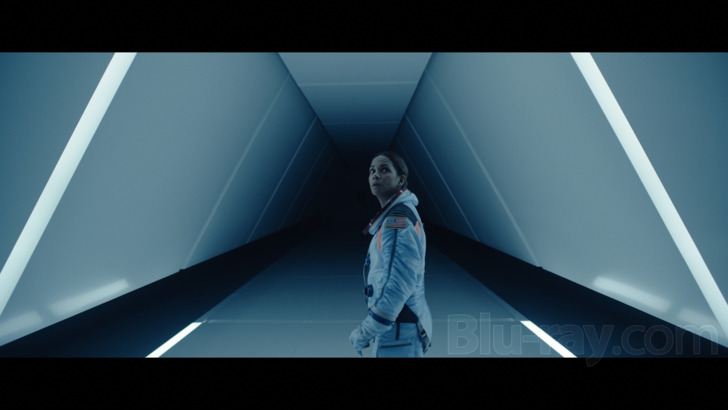
Moonfall features an admirably robust Atmos track that features consistent engagement and announces both its low end forcefulness and some of its higher aspirations (so to speak) from the get go, with big rumbling LFE combined with wafting airier effects in the opening scenes. "Little" moments like archival audio of "the Eagle has landed" then echo from front to back really invitingly, letting the listener know that some expert sound design is literally in the mix. While the film has its share of probably too convoluted "talky bits", once the actual devastation and destruction start setting in, the surround channels are regularly engaged and there are some almost tornado like effects as the destructive artificial intelligence snakes through the universe on its mission to eradicate little old humankind. Dynamic range is very wide throughout this presentation, and dialogue, effects and score are all rendered flawlessly. Optional English, French and Spanish subtitles are available.
Moonfall 4K Blu-ray Movie, Special Features and Extras 
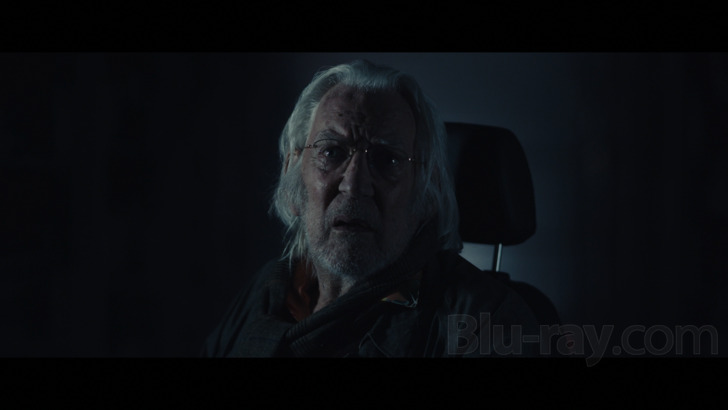
- Audio Commentary by Director / Writer Roland Emmerich and Writer / Producer / Composer Harald Kloser
- Against Impossible Odds: Making Moonfall (HD; 58:40) is a very well done aggregations of featurettes that gets into the genesis of the project and the actual production.
- Exploring the Moon: Past, Present and Future (HD; 26:29) has the perceived imprimatur of real authority courtesy of several interesting interviews with NASA types.
- Dr. K.C. Houseman Speaks the Truth! (HD; 7:49) offers a quartet of whimsical supposed YouTube-ish posts by Houseman, espousing his "crazy" theories. This comes with the helpful warning that it's fictitious.
Moonfall 4K Blu-ray Movie, Overall Score and Recommendation 
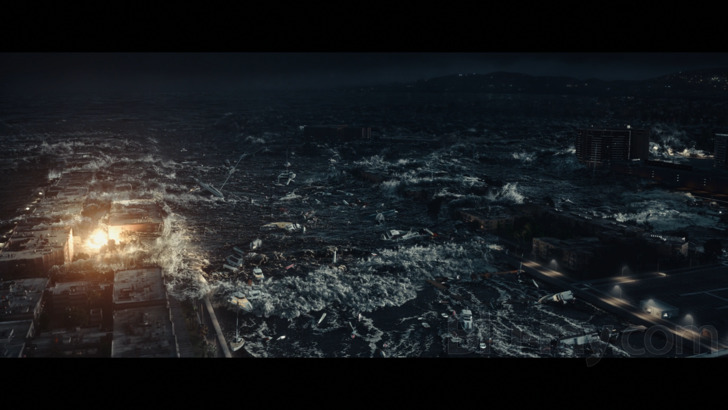
My hunch is those who love the kind of big, showy entertainments that Roland Emmerich is so skilled in crafting aren't going to care one whit about any perceived deficits in plotting or characterization. And as a cinematic "carnival ride" of sorts, while the destruction of the Earth is once again depicted in all its glory (?) in an Emmerich film, the whole "Moon as megastructure" aspect gives this at least a little bit of an innovative quality. Technical merits are solid, with the 4K version offering subtle but noticeable improvements in both palette and detail, and the supplements quite engaging, for those who may be considering making a purchase.
Similar titles
Similar titles you might also like

Independence Day: Resurgence
2016

Independence Day 4K
20th Anniversary Edition
1996

Battleship 4K
2012

Superman II 4K
1980

The Fifth Element 4K
20th Anniversary Edition
1997

Godzilla 4K
2014

Transformers: The Last Knight
2017

The Core 4K
20th Anniversary
2003

Man of Steel 4K
2013

Fantastic Four: Rise of the Silver Surfer
2007

Green Lantern
Extended and Theatrical versions
2011

Superman Returns
2006 Original Release
2006

Rampage
2018

Transformers: Age of Extinction 4K
2014

Superman: The Movie 4K
1978

Godzilla: King of the Monsters 4K
2019

Avengers: Endgame 4K
Cinematic Universe Edition
2019

Armageddon
1998

The Day After Tomorrow
2004

Jurassic World: Dominion
2022


